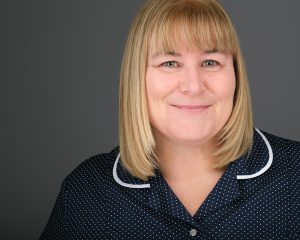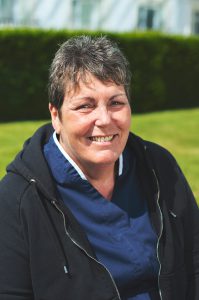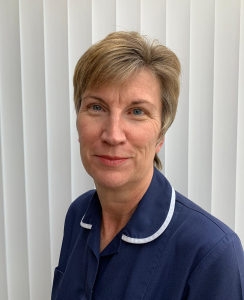
Fittleworth Nurses specialise in stoma and urology care; collectively sharing a breadth of experience and depth of knowledge spanning over 350 years! Here, in celebration of their work, they talk about what drives them; the challenges, the rewards, and how their clinical practice has evolved.
As Nursing Services Manager, Tina Maddams’ main concern during the height of the pandemic was making sure her nurses had everything they needed.
“My nurses are fearless. Eight of them were out on the road during the height of the pandemic. I am fiercely proud of them, all of them; but we can do the job we do, because we are given the tools we need and are supported”.

Tina Maddams, Nursing Services Manager
Tina was an enrolled nurse in the 1980s and at the age of 23, she joined the military. “I’ve experienced lots of different countries and worked in areas of conflict – I’ve met many incredible people along the way. I think it’s taught me to be flexible and resilient, and also that talking and getting things out in the open and connecting is so important within the team.
“There’s a big drive now to be talking more openly about conditions such as stoma care, but it is still quite a taboo subject in our culture, so we’re working hard to normalise it – it’s just a different way of managing a bodily function.
“Now with social media – many people are talking more openly about their experiences. The charities Colostomy UK and IA offer a lot of support. Each patient responds differently – some prefer to be private about it. The important thing is to ensure that people know there is support out there should they need or want it.”
Tina has experienced nursing across three decades in such an array of settings. She says this of Fittleworth: “There’s a sense that you know you’ll be looked after. The company’s values are unrivalled, and though it’s a bigger company than perhaps 10 years ago, it still has a family feel. Everyone wants to do a good job – no matter where they sit within the company. I feel valued here – the business will say, ‘we look after our people so they can look after their patients’.”
Meet the Fittleworth Stoma Nurses
Mandy Smart has been a qualified nurse for over 30 years. Before Fittleworth, Mandy worked at a Birmingham hospital as a Ward Manager where one of her Consultants asked if she’d like to work for him as a specialist nurse. This was a huge thing, she tells me, and led to her working for the Birmingham Bowel Clinic for 10 years.

Mandy Smart, Clinical Nurse Specialist
Mandy says since joining Fittleworth, she hasn’t looked back. “My services have grown unbelievably and throughout the pandemic, we’ve really supported hospitals, and I feel so lucky they’ve continued to refer to me. I believe Fittleworth was there when maybe some nursing services were unavailable due to the pandemic.”
Changes to your work during and since covid?
“The stoma care is the easy part”, she says – “It’s the bigger picture, and giving that psychological support – and you know, we’ve taught patient’s families how to change stoma bags online and that is so innovative.
“We’ve expanded our roles and I must say there have been some difficult and challenging times but when I look at my 5-star reviews, I know I’ve made a difference. It fills my heart and after 30-plus years I am still lucky enough to say I love my job.
“As nurses, it is instilled in you to remain calm and professional, but we also experienced that fear during the pandemic. We were concerned about what lay ahead for us, our patients and colleagues, and our families. We were ultra-careful, but there are very few of us now who haven’t had covid, and I count myself as incredibly lucky to be one of those few. I am not saying there weren’t dark days, but as nurses, you’re given coping strategies; certainly, I was when I trained, and we were taught to think outside the box and to look at creative ways to solve problems on a daily basis”.
Mandy talks about the support available for Fittleworth Nurses – “We’ve been extremely lucky to have that support. We have counselling available to us, there to utilise if we need it. It hasn’t been easy. We have worked hard to ensure a seamless transition from hospital to home and I think if we can support our patients by doing that, then we are offering a quality service – and if you go with that mantra in your heart every single day then you can’t go far wrong.
As a nursing team, we’ve come out stronger on the other side. We are better prepared for the next event. As a nursing service, Fittleworth has really put its head above the parapet and I am proud to be one of those nurses.”
Cath Dixon joined Fittleworth during the coronavirus pandemic. If you’ve met Cath you’ll know she has a beautifully gentle, lyrical Welsh accent. I ask her why nursing? “I always wanted to be a nurse and my family used to say, ‘she’s never going to be a nurse’. They said I’d never be a nurse due to my issue around unclean toilets!”

Cath Dixon, Clinical Nurse Specialist
Why stoma nursing?
Cath’s Aunty was given a stoma due to bowel cancer. “She was a very proud lady, very conscious of her appearance – very private, and to have this colostomy was devastating. Everybody knows everybody in the valleys and she wasn’t keen on the local stoma nurse, so she said, ‘oh well, good practice for you – you can look after me’. And I learned so much, and to see how she went through it emotionally, I thought – I’ve got to transfer this to other patients, and so I became a stoma nurse at the age of 27 – and have been there ever since – and I am 56 in one month’s time.”
Cath tells me about a patient in his 40s –“A keen cyclist who was experiencing a lot of pain. He thought it was an abscess and tried to self-medicate. After no success, he went to his GP. A CT scan revealed bowel cancer that had also impacted his bladder”. This meant he’d need a colostomy and a urostomy. He was referred to Cath – “He came to see me – a big chunky guy, but like a rabbit in the headlights. So we sat down and talked. And we talked about his fears. He said, ‘I’ve still got so much to give – is this cancer going to get me?’ Halfway through this conversation, I thought, this guy – if he could just be around someone who’s been through this, same age as him, to see there is life after this.”
So Cath set up a meeting. She calls it her buddy system. The two men met – and after that?
“After that, that guy left there totally different. And every now and again, because I don’t see him regularly now, he drops me a text message – a photo of his new dog, or a sunset by the beach, and on his 50th birthday he sent me a message – ‘I’ve made my 50th’.
“And even though I’m not his nurse anymore, I still keep in touch with him – and this gang – this team of people because it’s so rewarding, and to see somebody getting over it, to see the milestones they make; that’s the reward – the total reward and you get one every day”.
For Tammy Temple, the challenge was to learn about stoma care virtually. Having originally joined Nottingham Appliance Management Services as a Prescriber, in pre-covid times, Tammy would have learned about stoma care practically, with the usual hands-on approach. With covid restrictions that wasn’t possible, and thanks to all the digital tools at our fingertips now, she managed her learning in a virtual classroom.
Tammy has been a nurse for 15 years. She tells me, “It’s the best job I’ve ever had. I cry quite often,” – I ask her, can I say this in the blog? She laughs and tells me she’s known for being a crier. “The feedback I get from patients is lovely and really makes an impact. You can genuinely change people’s lives, and that’s not me being overly sentimental. If you get a patient who can’t go anywhere, because every time they move, they leak; or a patient who’s had sore skin for years, and you can improve that for them, that’s life-changing.”
Tammy and her colleagues give support; not just in terms of the physical elements of post-surgery, but all the layers of anxiety and uncertainty that go with it. Subjects that are hard to broach – like intimacy, relationships, and body confidence.
Tammy gets a great sense of fulfilment from her work. The direct feedback from patient reviews on iwantgreatcare.org makes her feel warm, she says, and she shares the reviews with her family.
“It’s all about building a relationship”, Tammy says – “a rapour and a safe place for people to be able to talk about what they need.”
Meet the Fittleworth Urology Nurses
Jackie Parker always wanted to be a nurse. She has no clue where the influence or inspiration came from, but at the age of around 10 or 11, she confirmed to her family this was her vocation. Jackie has been nursing her whole life. She specialised in continence care, which came from her own experience with her daughter who, when very small, had recurring bladder infections. After one particularly hostile encounter with a nursery school teacher, who told Jackie that as a nurse, she should know better than to send her daughter to school in wet clothing, Jackie was compelled to better understand this area of medicine. Happily, her daughter is very well now and since then Jackie has gone on to support and make a difference to the lives of many patients going through continence issues.

Jackie Parker, Clinical Nurse Specialist
“It’s not uncommon for people to go on accepting their discomfort, rather than ask for help, or daring to hope there might be a solution”, she tells me.
“Often women will say things like, ‘I’ve had 4 children so I expect to be incontinent.’ But you needn’t expect it”, says Jackie. “There is help and there are solutions and”, she says, “You shouldn’t expect it, no matter your age.”
The bladder is an interesting organ. Jackie tells me about patients who have exceeded their, and sometimes her expectations of the incredible resilience of the human body.
She tells me of a young female patient who was blind and who told Jackie, ‘You’ll never be able to teach me this.’
But Jackie was determined and they managed it together – a life-changing moment for that patient. Another incredible patient was a lady in her mid-nineties: “She was very refined, in a twin set and pearls, and my immediate thought was that this was going to be tricky. However, I was proven wrong by this determined, straight-talking lady.
“Better still, her bladder regained its muscle tone – something that can happen”, Jackie tells me.
“So she didn’t have to use the technique for long because her bladder grew strong enough to work by itself again.”
Marie Riding began working in Continence services in 1999 and has been on the Fittleworth Urology team for 7 years. Marie delivers the ISC (Intermittent self-catheterisation) training course for nurses. The course is taught via webinars and is the only accredited ISC training for nurses in the UK.

Marie Riding, Clinical Nurse Specialist
Why ISC training?
“While nurses can be familiar and able to support patients managing with indwelling catheterisation, the conversion to ISC can often be tricky, because nurses don’t feel they have the education or information to be able to assist patients fully.
“So we wrote a program to deliver that education, not only giving nurses a qualification but the confidence to assist patients with ISC. The course has been accredited by the Royal College of Nursing and we run around four per year. I have trained 150 nurses since we began”.
Most rewarding?
“I feel in a fortunate position with what I do – even the smallest thing can make a powerful difference to somebody. I saw a patient who wasn’t managing his indwelling catheter at home. When I arrived he was in a terrible state and he’d been wearing the same bag for 21 days. Being able to show him how to manage that made a massive difference to his quality of life”.
Patients who have exceeded their own expectations?
“When a patient is referred for ISC, they will often have been dreading your appointment; they are having sleepless nights – they are panicking; they don’t want to do this; they won’t have slept. We spend a lot of time teaching them, reassuring them, and persuading them to pluck up the courage to have a go. And I would say 80 percent if not more say, ‘it’s not as bad as I thought.’
“One gentleman had put the appointment off twice. After he’d learned to self-catheterise, he told me he’d not slept so well in 15 years and the only time he did wake was because of the dog, not his bladder! He just couldn’t believe the difference”.
This blog is being published on International Day of the Nurse – What does this day mean to you?
“It is important and it’s lovely to be recognised, but we’re not a group of people who shout about how good we are!
“What I want to do is raise the profile of nursing and encourage people into a nursing career – so that’s what International Nurses Day is for me. It’s saying it’s a great job, we do a lot of good; we make a lot of difference, come and join us.
If you’d like to find out more about the Fittleworth ISC training program, you can find more information and request course dates on our website.
If you’ve received great care, and you’d like to let our nurses know, you can write a review on iwantgreatcare.org.
Cover illustration by Andy Stonehouse
